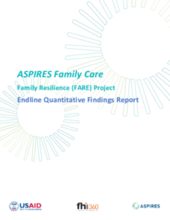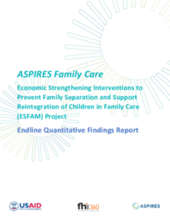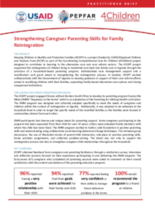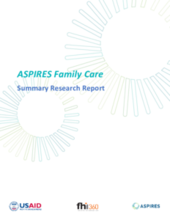Displaying 231 - 240 of 947
This video shares insights from Angkor Hospital for Children on how to conduct family tracing in the event abandonment has already occurred, including identifying leads and key sources of information.
In this video, Children in Families ABLE project practitioners discuss their key learning with respect to supporting caregivers to care for children, including the importance of managing stress and expectations, developing trusting relationships and taking a whole family approach to support.
This video shares some of the key learning from the pilot phase of Cambodian Children’s Trust Holistic Family Preservation Program in rural Cambodia.
The Family Resilience (FARE) project was developed to help build the evidence base on how to appropriately match economic strengthening (ES) activities with families at risk of family-child separation and with families in the process of reintegrating a previously separated child. The project offered an opportunity for learning about how to provide ES and other family strengthening services and how well they worked. This report focuses on the latter and summarizes changes in key indicators related to family-child separation over the course of the project.
The Economic Strengthening to Keep and Reintegrate Children in Family Care (ESFAM) project was developed to help build the evidence base on how to appropriately match economic strengthening (ES) activities with families at risk of family-child separation and with families in the process of reintegrating a previously separated child. In addition to supporting families, ESFAM offered an opportunity for learning about how to provide these services and how well they worked. This report focuses on the latter and summarizes changes in key indicators related to family-child separation over the course of the project.
This Practitioner Brief from the the Coordinating Comprehensive Care for Children (4Children) project presents key learning and recommendations from the Keeping Children in Healthy and Protective Families (KCHPF) project in Uganda, which supported the reintegration of children living in residential care back into family care through the provision of a household-based parenting program, individualized case management support and a reunification cash grant aimed at strengthening the reintegration process.
The Accelerating Strategies for Practical Innovation and Research in Economic Strengthening (ASPIRES) Family Care Project focused on how economic strengthening (ES) interventions can help prevent unnecessary separation of children from families as well as support the reintegration into family care of children who were already separated. This mixed methods evaluation was implemented alongside programming that included longitudinal quantitative data collection with all participating FARE and ESFAM households at three time points to assess a range of indicators related to household economic and family well-being, as well as in-depth, longitudinal qualitative research to help understand how (well), from participants’ perspectives, the FARE and ESFAM interventions aligned with perceived drivers of separation and families’ experienced child-level effects of programming.
This study tested a web‐based parenting course called FosterParentCollege.com (FPC) Culturally Competent Parenting (CCP) for transracial foster and adoptive parents.
The purpose of this systematic review is to synthesize existing research on community- and home-based interventions designed to improve parenting and reduce risk of maltreatment for families with substance-exposed newborns (SENs), applying a program logic framework.
This paper describes one researcher’s reflections about their own engagement with participants of an evaluation of a parenting course.




